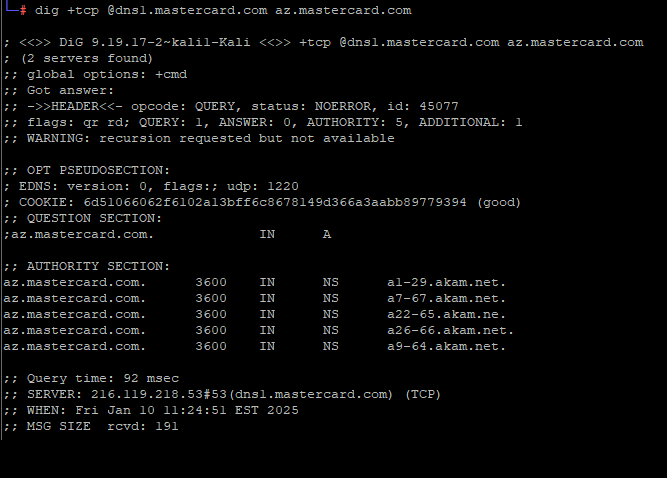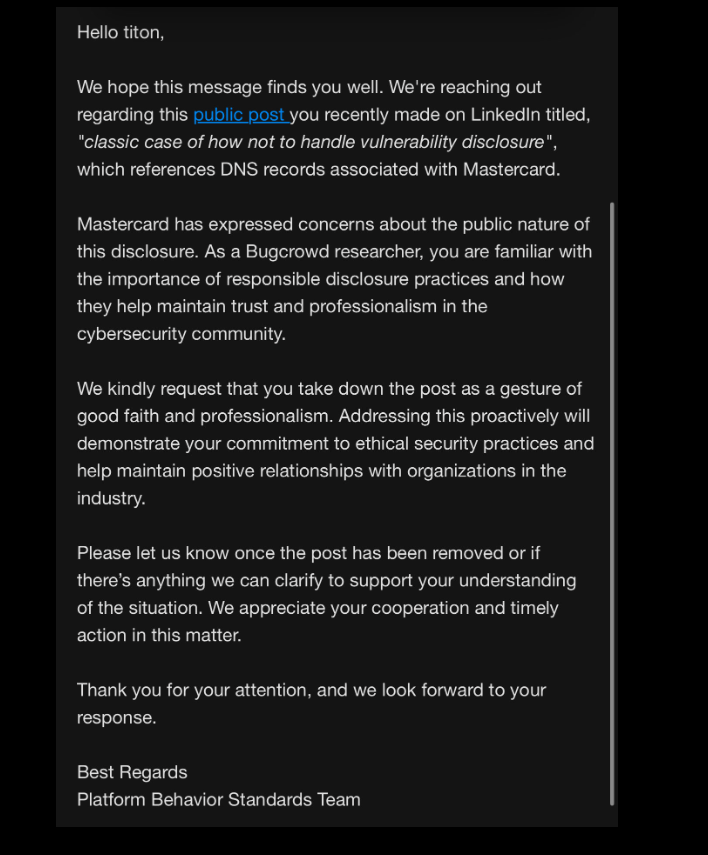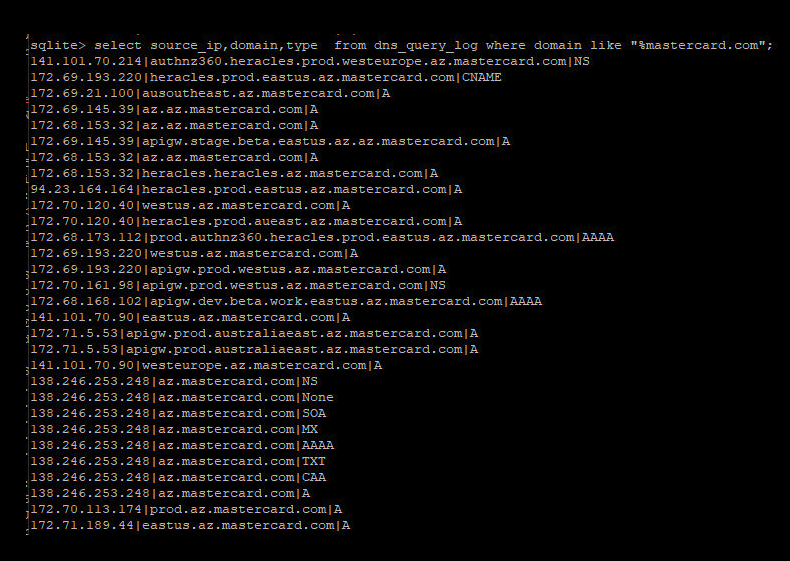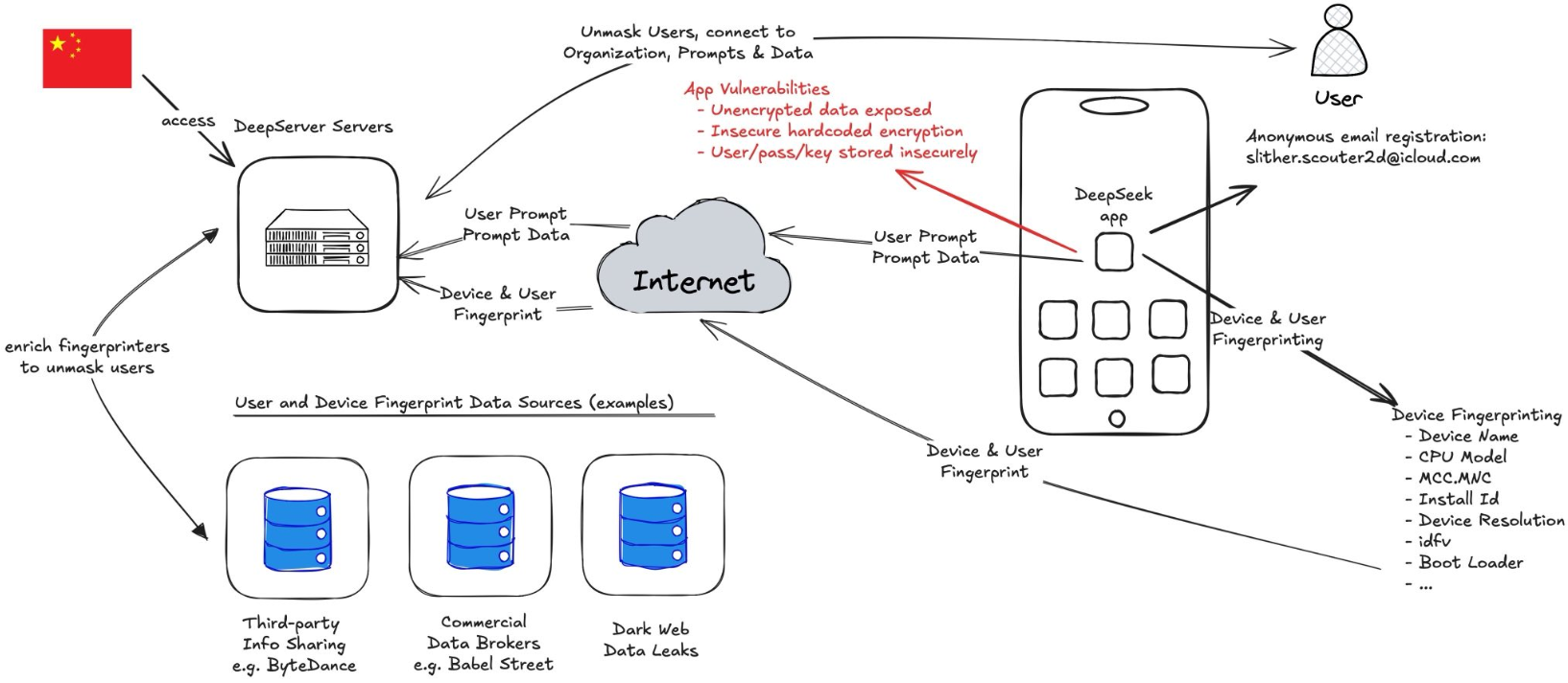Reading view
Super Bowl Fumble: Google Rushes to Edit Out Bogus Info from Big Game AI Ad
Google has egg on its face as it rushes to edit an advertisement for the Gemini AI tool before its broadcast during the Super Bowl. The ad was found to contain false information about cheese consumption likely "hallucinated" by the bumbling tech giant's woke AI.
The post Super Bowl Fumble: Google Rushes to Edit Out Bogus Info from Big Game AI Ad appeared first on Breitbart.
Experts Flag Security, Privacy Risks in DeepSeek AI App
New mobile apps from the Chinese artificial intelligence (AI) company DeepSeek have remained among the top three “free” downloads for Apple and Google devices since their debut on Jan. 25, 2025. But experts caution that many of DeepSeek’s design choices — such as using hard-coded encryption keys, and sending unencrypted user and device data to Chinese companies — introduce a number of glaring security and privacy risks.

Public interest in the DeepSeek AI chat apps swelled following widespread media reports that the upstart Chinese AI firm had managed to match the abilities of cutting-edge chatbots while using a fraction of the specialized computer chips that leading AI companies rely on. As of this writing, DeepSeek is the third most-downloaded “free” app on the Apple store, and #1 on Google Play.
DeepSeek’s rapid rise caught the attention of the mobile security firm NowSecure, a Chicago-based company that helps clients screen mobile apps for security and privacy threats. In a teardown of the DeepSeek app published today, NowSecure urged organizations to remove the DeepSeek iOS mobile app from their environments, citing security concerns.
NowSecure founder Andrew Hoog said they haven’t yet concluded an in-depth analysis of the DeepSeek app for Android devices, but that there is little reason to believe its basic design would be functionally much different.
Hoog told KrebsOnSecurity there were a number of qualities about the DeepSeek iOS app that suggest the presence of deep-seated security and privacy risks. For starters, he said, the app collects an awful lot of data about the user’s device.
“They are doing some very interesting things that are on the edge of advanced device fingerprinting,” Hoog said, noting that one property of the app tracks the device’s name — which for many iOS devices defaults to the customer’s name followed by the type of iOS device.
The device information shared, combined with the user’s Internet address and data gathered from mobile advertising companies, could be used to deanonymize users of the DeepSeek iOS app, NowSecure warned. The report notes that DeepSeek communicates with Volcengine, a cloud platform developed by ByteDance (the makers of TikTok), although NowSecure said it wasn’t clear if the data is just leveraging ByteDance’s digital transformation cloud service or if the declared information share extends further between the two companies.
Perhaps more concerning, NowSecure said the iOS app transmits device information “in the clear,” without any encryption to encapsulate the data. This means the data being handled by the app could be intercepted, read, and even modified by anyone who has access to any of the networks that carry the app’s traffic.
“The DeepSeek iOS app globally disables App Transport Security (ATS) which is an iOS platform level protection that prevents sensitive data from being sent over unencrypted channels,” the report observed. “Since this protection is disabled, the app can (and does) send unencrypted data over the internet.”
Hoog said the app does selectively encrypt portions of the responses coming from DeepSeek servers. But they also found it uses an insecure and now deprecated encryption algorithm called 3DES (aka Triple DES), and that the developers had hard-coded the encryption key. That means the cryptographic key needed to decipher those data fields can be extracted from the app itself.
There were other, less alarming security and privacy issues highlighted in the report, but Hoog said he’s confident there are additional, unseen security concerns lurking within the app’s code.
“When we see people exhibit really simplistic coding errors, as you dig deeper there are usually a lot more issues,” Hoog said. “There is virtually no priority around security or privacy. Whether cultural, or mandated by China, or a witting choice, taken together they point to significant lapse in security and privacy controls, and that puts companies at risk.”
Apparently, plenty of others share this view. Axios reported on January 30 that U.S. congressional offices are being warned not to use the app.
“[T]hreat actors are already exploiting DeepSeek to deliver malicious software and infect devices,” read the notice from the chief administrative officer for the House of Representatives. “To mitigate these risks, the House has taken security measures to restrict DeepSeek’s functionality on all House-issued devices.”
TechCrunch reports that Italy and Taiwan have already moved to ban DeepSeek over security concerns. Bloomberg writes that The Pentagon has blocked access to DeepSeek. CNBC says NASA also banned employees from using the service, as did the U.S. Navy.
Beyond security concerns tied to the DeepSeek iOS app, there are indications the Chinese AI company may be playing fast and loose with the data that it collects from and about users. On January 29, researchers at Wiz said they discovered a publicly accessible database linked to DeepSeek that exposed “a significant volume of chat history, backend data and sensitive information, including log streams, API secrets, and operational details.”
“More critically, the exposure allowed for full database control and potential privilege escalation within the DeepSeek environment, without any authentication or defense mechanism to the outside world,” Wiz wrote. [Full disclosure: Wiz is currently an advertiser on this website.]
KrebsOnSecurity sought comment on the report from DeepSeek and from Apple. This story will be updated with any substantive replies.
AI can be good and bad at the same time
ChatGPT Mystery: Family of OpenAI Whistleblower Sues for Access to San Francisco Police Records
The parents of the late Suchir Balaji, a former OpenAI employee who blew the whistle on the company's alleged copyright infringements, have filed a lawsuit against San Francisco officials for denying them access to police reports and other records related to their son's death.
The post ChatGPT Mystery: Family of OpenAI Whistleblower Sues for Access to San Francisco Police Records appeared first on Breitbart.
Update: Cybercriminals still not fully on board the AI train (yet)
MasterCard DNS Error Went Unnoticed for Years
The payment card giant MasterCard just fixed a glaring error in its domain name server settings that could have allowed anyone to intercept or divert Internet traffic for the company by registering an unused domain name. The misconfiguration persisted for nearly five years until a security researcher spent $300 to register the domain and prevent it from being grabbed by cybercriminals.

A DNS lookup on the domain az.mastercard.com on Jan. 14, 2025 shows the mistyped domain name a22-65.akam.ne.
From June 30, 2020 until January 14, 2025, one of the core Internet servers that MasterCard uses to direct traffic for portions of the mastercard.com network was misnamed. MasterCard.com relies on five shared Domain Name System (DNS) servers at the Internet infrastructure provider Akamai [DNS acts as a kind of Internet phone book, by translating website names to numeric Internet addresses that are easier for computers to manage].
All of the Akamai DNS server names that MasterCard uses are supposed to end in “akam.net” but one of them was misconfigured to rely on the domain “akam.ne.”
This tiny but potentially critical typo was discovered recently by Philippe Caturegli, founder of the security consultancy Seralys. Caturegli said he guessed that nobody had yet registered the domain akam.ne, which is under the purview of the top-level domain authority for the West Africa nation of Niger.
Caturegli said it took $300 and nearly three months of waiting to secure the domain with the registry in Niger. After enabling a DNS server on akam.ne, he noticed hundreds of thousands of DNS requests hitting his server each day from locations around the globe. Apparently, MasterCard wasn’t the only organization that had fat-fingered a DNS entry to include “akam.ne,” but they were by far the largest.
Had he enabled an email server on his new domain akam.ne, Caturegli likely would have received wayward emails directed toward mastercard.com or other affected domains. If he’d abused his access, he probably could have obtained website encryption certificates (SSL/TLS certs) that were authorized to accept and relay web traffic for affected websites. He may even have been able to passively receive Microsoft Windows authentication credentials from employee computers at affected companies.
But the researcher said he didn’t attempt to do any of that. Instead, he alerted MasterCard that the domain was theirs if they wanted it, copying this author on his notifications. A few hours later, MasterCard acknowledged the mistake, but said there was never any real threat to the security of its operations.
“We have looked into the matter and there was not a risk to our systems,” a MasterCard spokesperson wrote. “This typo has now been corrected.”
Meanwhile, Caturegli received a request submitted through Bugcrowd, a program that offers financial rewards and recognition to security researchers who find flaws and work privately with the affected vendor to fix them. The message suggested his public disclosure of the MasterCard DNS error via a post on LinkedIn (after he’d secured the akam.ne domain) was not aligned with ethical security practices, and passed on a request from MasterCard to have the post removed.

MasterCard’s request to Caturegli, a.k.a. “Titon” on infosec.exchange.
Caturegli said while he does have an account on Bugcrowd, he has never submitted anything through the Bugcrowd program, and that he reported this issue directly to MasterCard.
“I did not disclose this issue through Bugcrowd,” Caturegli wrote in reply. “Before making any public disclosure, I ensured that the affected domain was registered to prevent exploitation, mitigating any risk to MasterCard or its customers. This action, which we took at our own expense, demonstrates our commitment to ethical security practices and responsible disclosure.”
Most organizations have at least two authoritative domain name servers, but some handle so many DNS requests that they need to spread the load over additional DNS server domains. In MasterCard’s case, that number is five, so it stands to reason that if an attacker managed to seize control over just one of those domains they would only be able to see about one-fifth of the overall DNS requests coming in.
But Caturegli said the reality is that many Internet users are relying at least to some degree on public traffic forwarders or DNS resolvers like Cloudflare and Google.
“So all we need is for one of these resolvers to query our name server and cache the result,” Caturegli said. By setting their DNS server records with a long TTL or “Time To Live” — a setting that can adjust the lifespan of data packets on a network — an attacker’s poisoned instructions for the target domain can be propagated by large cloud providers.
“With a long TTL, we may reroute a LOT more than just 1/5 of the traffic,” he said.
The researcher said he’d hoped that the credit card giant might thank him, or at least offer to cover the cost of buying the domain.
“We obviously disagree with this assessment,” Caturegli wrote in a follow-up post on LinkedIn regarding MasterCard’s public statement. “But we’ll let you judge— here are some of the DNS lookups we recorded before reporting the issue.”

Caturegli posted this screenshot of MasterCard domains that were potentially at risk from the misconfigured domain.
As the screenshot above shows, the misconfigured DNS server Caturegli found involved the MasterCard subdomain az.mastercard.com. It is not clear exactly how this subdomain is used by MasterCard, however their naming conventions suggest the domains correspond to production servers at Microsoft’s Azure cloud service. Caturegli said the domains all resolve to Internet addresses at Microsoft.
“Don’t be like Mastercard,” Caturegli concluded in his LinkedIn post. “Don’t dismiss risk, and don’t let your marketing team handle security disclosures.”
One final note: The domain akam.ne has been registered previously — in December 2016 by someone using the email address um-i-delo@yandex.ru. The Russian search giant Yandex reports this user account belongs to an “Ivan I.” from Moscow. Passive DNS records from DomainTools.com show that between 2016 and 2018 the domain was connected to an Internet server in Germany, and that the domain was left to expire in 2018.
This is interesting given a comment on Caturegli’s LinkedIn post from an ex-Cloudflare employee who linked to a report he co-authored on a similar typo domain apparently registered in 2017 for organizations that may have mistyped their AWS DNS server as “awsdns-06.ne” instead of “awsdns-06.net.” DomainTools reports that this typo domain also was registered to a Yandex user (playlotto@yandex.ru), and was hosted at the same German ISP — Team Internet (AS61969).
Microsoft: Happy 2025. Here’s 161 Security Updates
Microsoft today unleashed updates to plug a whopping 161 security vulnerabilities in Windows and related software, including three “zero-day” weaknesses that are already under active attack. Redmond’s inaugural Patch Tuesday of 2025 bundles more fixes than the company has shipped in one go since 2017.

Rapid7‘s Adam Barnett says January marks the fourth consecutive month where Microsoft has published zero-day vulnerabilities on Patch Tuesday without evaluating any of them as critical severity at time of publication. Today also saw the publication of nine critical remote code execution (RCE) vulnerabilities.
The Microsoft flaws already seeing active attacks include CVE-2025-21333, CVE-2025-21334 and, you guessed it– CVE-2025-21335. These are sequential because all reside in Windows Hyper-V, a component that is heavily embedded in modern Windows 11 operating systems and used for security features including device guard and credential guard.
Tenable’s Satnam Narang says little is known about the in-the-wild exploitation of these flaws, apart from the fact that they are all “privilege escalation” vulnerabilities. Narang said we tend to see a lot of elevation of privilege bugs exploited in the wild as zero-days in Patch Tuesday because it’s not always initial access to a system that’s a challenge for attackers as they have various avenues in their pursuit.
“As elevation of privilege bugs, they’re being used as part of post-compromise activity, where an attacker has already accessed a target system,” he said. “It’s kind of like if an attacker is able to enter a secure building, they’re unable to access more secure parts of the facility because they have to prove that they have clearance. In this case, they’re able to trick the system into believing they should have clearance.”
Several bugs addressed today earned CVSS (threat rating) scores of 9.8 out of a possible 10, including CVE-2025-21298, a weakness in Windows that could allow attackers to run arbitrary code by getting a target to open a malicious .rtf file, documents typically opened on Office applications like Microsoft Word. Microsoft has rated this flaw “exploitation more likely.”
Ben Hopkins at Immersive Labs called attention to the CVE-2025-21311, a 9.8 “critical” bug in Windows NTLMv1 (NT LAN Manager version 1), an older Microsoft authentication protocol that is still used by many organizations.
“What makes this vulnerability so impactful is the fact that it is remotely exploitable, so attackers can reach the compromised machine(s) over the internet, and the attacker does not need significant knowledge or skills to achieve repeatable success with the same payload across any vulnerable component,” Hopkins wrote.
Kev Breen at Immersive points to an interesting flaw (CVE-2025-21210) that Microsoft fixed in its full disk encryption suite Bitlocker that the software giant has dubbed “exploitation more likely.” Specifically, this bug holds out the possibility that in some situations the hibernation image created when one closes the laptop lid on an open Windows session may not be fully encrypted and could be recovered in plain text.
“Hibernation images are used when a laptop goes to sleep and contains the contents that were stored in RAM at the moment the device powered down,” Breen noted. “This presents a significant potential impact as RAM can contain sensitive data (such as passwords, credentials and PII) that may have been in open documents or browser sessions and can all be recovered with free tools from hibernation files.”
Tenable’s Narang also highlighted a trio of vulnerabilities in Microsoft Access fixed this month and credited to Unpatched.ai, a security research effort that is aided by artificial intelligence looking for vulnerabilities in code. Tracked as CVE-2025-21186, CVE-2025-21366, and CVE-2025-21395, these are remote code execution bugs that are exploitable if an attacker convinces a target to download and run a malicious file through social engineering. Unpatched.ai was also credited with discovering a flaw in the December 2024 Patch Tuesday release (CVE-2024-49142).
“Automated vulnerability detection using AI has garnered a lot of attention recently, so it’s noteworthy to see this service being credited with finding bugs in Microsoft products,” Narang observed. “It may be the first of many in 2025.”
If you’re a Windows user who has automatic updates turned off and haven’t updated in a while, it’s probably time to play catch up. Please consider backing up important files and/or the entire hard drive before updating. And if you run into any problems installing this month’s patch batch, drop a line in the comments below, please.
Further reading on today’s patches from Microsoft:
Trump Meets Nvidia CEO Jensen Huang at White House to Discuss China's DeepSeek, Tightening Chip Exports
President Donald Trump and Nvidia CEO Jensen Huang reportedly met at the White House on Friday to discuss China's DeepSeek AI technology and what to do with regards to tightening chip exports moving forward.
The post Trump Meets Nvidia CEO Jensen Huang at White House to Discuss China’s DeepSeek, Tightening Chip Exports appeared first on Breitbart.
OpenAI Investigates Potential IP Theft by China's DeepSeek AI
OpenAI, the creator of the popular ChatGPT AI chatbot, claims to have found evidence suggesting that Chinese AI upstart DeepSeek used OpenAI's data to train its own competing models.
The post OpenAI Investigates Potential IP Theft by China’s DeepSeek AI appeared first on Breitbart.
China's DeepSeek AI Platform Raises Concerns over Data Privacy and National Security
China's DeepSeek rocked the world of AI this week, but beyond questions about how the company actually developed its model, fresh concerns about its data collection practices and potential national security implications are popping up.
The post China’s DeepSeek AI Platform Raises Concerns over Data Privacy and National Security appeared first on Breitbart.
Silicon Valley Tech Workers Quietly Protest Their Bosses’ Embrace of Trump
China's DeepSeek AI Causes Market to Tumble - but Analysts Are Skeptical
Chinese AI company DeepSeek has emerged as a potential challenger to U.S. tech giants, demonstrating breakthrough AI models that claim to offer performance comparable to leading offerings at a fraction of the cost. The entire U.S. market is taking a tumble on Monday morning as a result, but many analysts are skeptical of the company's claims.
The post China’s DeepSeek AI Causes Market to Tumble – but Analysts Are Skeptical appeared first on Breitbart.
Paul McCartney Calls for Artist Protections Against Artificial Intelligence
Paul McCartney urged the British government not to make a change to copyright laws that he says could let artificial intelligence companies rip off artists.
The post Paul McCartney Calls for Artist Protections Against Artificial Intelligence appeared first on Breitbart.
President Trump Signs Executive Order to Promote AI Innovation Free from Leftist Bias
President Donald Trump signed an executive order on Thursday aimed at developing AI systems that are free from ideological bias and engineered social agendas. Scientific studies have demonstrated that essentially all popular AI chatbots show a leftist bias.
The post President Trump Signs Executive Order to Promote AI Innovation Free from Leftist Bias appeared first on Breitbart.
MeToo Outrage Leaves Japanese Broadcaster Without a Single Advertiser
OpenAI Boss Sam Altman Expresses Support for Donald Trump, Regrets Being an 'NPC' During Previous Term
OpenAI chief Sam Altman has expressed a change in his perspective on Donald Trump, stating that he wishes he had done more of his own thinking and avoided falling into the "NPC" trap during Trump's previous term.
The post OpenAI Boss Sam Altman Expresses Support for Donald Trump, Regrets Being an ‘NPC’ During Previous Term appeared first on Breitbart.
Packed In for Trump’s Indoor Inauguration, Awkwardness Abounds
Big Tech Titans Bezos, Zuckerberg, and Pichai Seated by Elon Musk at Trump Inauguration
The most influential tech platforms have are attending President-elect Donald Trump's inauguration after donating millions of dollars to his inauguration committee.
The post Big Tech Titans Bezos, Zuckerberg, and Pichai Seated by Elon Musk at Trump Inauguration appeared first on Breitbart.
Google CEO to Attend Inauguration After Search Giant Planned to Host Party for Leftists Plotting to 'Resist the Republican Agenda'
Google CEO Sundar Pichai will attend Monday's inauguration of President-elect Donald Trump after the search giant in November planned to cohost a social event with Democrat super PAC Priorities USA, as those Democrats sought to "resist the Republican agenda."
The post Google CEO to Attend Inauguration After Search Giant Planned to Host Party for Leftists Plotting to ‘Resist the Republican Agenda’ appeared first on Breitbart.
